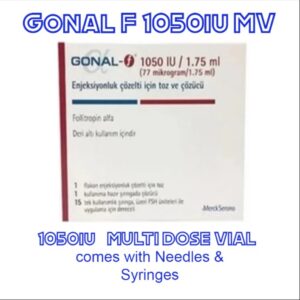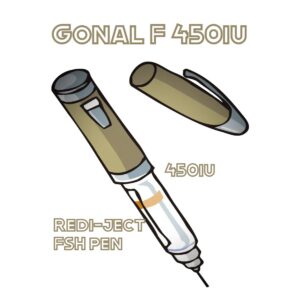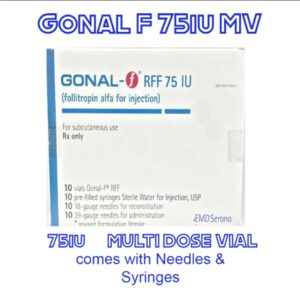Gonal-F
IMPORTANT TO KNOW ABOUT GONAL-F
Gonal-F is a natural hormone. In women, this hormone makes eggs grow. In men, it helps produce sperm.
In women and men who have difficulty having children.
To mature eggs: you start within a week after you have your period. You will be given an injection every day for at least 1 week. With an ultrasound, your doctor will see if your eggs are growing enough.
You have a greater chance of becoming pregnant with more than one child (for example, twins). This is because several eggs can develop at the same time.
To make sperm cells: you are given an injection 3 times a week.
The place where you received the injection may hurt. Especially during the first few days. You may also experience headaches, and painful, tight breasts (both men and women).
Your ovaries may overreact to the medicine. Too many eggs may develop. Alert your doctor if you have severe abdominal pain, diarrhea, vomiting or if you are easily out of breath.
It is important to be sure you are not pregnant when you start this medicine.
You may use this medicine if you are breastfeeding. However, this medicine may cause you to make less breast milk.
What Does Gonal-F (Follitropin Alfa) Do?
GONAL F stimulates ovarian follicular growth in women who do not have primary ovarian failure. FSH is the primary hormone responsible for follicular recruitment and development.
Gonal-F is also called follicle-stimulating hormone and is abbreviated as FSH. It is a body’s own hormone produced by an organ in the brain (the pituitary gland).
In women, Follitropin Alfa stimulates the growth and maturation of eggs. In addition, it stimulates the ovaries to make the female sex hormone estrogen.
In men, follitropin stimulates sperm production.
Doctors prescribe this drug in cases of reduced fertility.
Reduced Fertility
Pregnancy requires a matured egg. The egg matures in the ovaries under the influence of the hormone follitropin. When the egg is sufficiently developed, it is released for fertilization. This is called ovulation.
A male sperm can then fertilize the released egg. The testes continuously produce new sperm cells for this purpose. The testes are prompted to do this by the hormone follitropin. Follitropin Alpha also stimulates testosterone production by the testicles.
Gonal-F is used in women and in men who cannot have children.
Causes
Fertility may be reduced, for example, if the body does not produce enough follitropin (this form of infertility is called hypogonadotropic hypogonadism). In women, a mature egg is then not released. In men, too few sperm cells are produced.
Reduced fertility in women can also result from enlarged ovaries (polycystic ovarian syndrome, PCOS).
Furthermore, there are many other causes of reduced fertility. These are often treated with IVF (In Vitro Fertilization).
Treatment in men
In men with hypogonadotropic hypogonadism, follitropin can trigger sperm production within a few months.
Treatment in women
If reduced fertility is because no eggs are maturing, the doctor can use follitropin to stimulate egg maturation. After ovulation, you must then have sexual intercourse or the doctor inserts the sperm cells into the uterus (insemination).
In IVF (In Vitro Fertilization) treatment, fertilization takes place outside the body. Several eggs are needed for IVF treatment. Therefore, egg maturation is stimulated with Gonal-F. After ovulation, the doctor removes the mature eggs from the ovaries for subsequent fertilization outside the body.
Prior to the administration of follitropin, you often must also take nafarelin or triptorelin. These medications make follitropin more effective.
The intercourse, insemination or “harvesting” of eggs must take place exactly around ovulation. Therefore, usually at the time when the eggs have matured sufficiently, the doctor gives an injection of the hormone HCG (human chorionic gonadotropin). This hormone stimulates ovulation.
If you do not have your period two weeks after the attempted fertilization, it does not mean that you are pregnant. Usually menstruation comes a little later because of the hormones. Also, a pregnancy test is not reliable because of the hormones you have used. Therefore, only the doctor can diagnose a possible pregnancy.
What are possibible side effects ?
In addition to the desired effect, this drug may cause side effects. The main side effects are as follows:
Side effects in women
- Sometimes (in 10 to 30 in 100 people).
Pain at the injection site, redness, swelling, itching and bruising. Especially during the first few days of treatment. Headache, Painful tense breasts
- Rare (in 1 to 10 in 100 people)
Fatigue and very rarely drowsiness and dizziness, Gastrointestinal symptoms, such as nausea and vomiting, diarrhea, abdominal cramps, constipation and abdominal pain, Overreaction of the ovaries, Multiple pregnancy
- Very rarely (in less than 1 in 100 people)
Skin rash, itching and hives due to hypersensitivity to this medicine, Blood from the vagina.
Consult your doctor if you experience too many of the side effects listed below or if you experience other side effects that worry you.
Side effects in men
- Sometimes (in 10 to 30 in 100 people)
Pain at the injection site, redness, swelling, itching and bruising. Especially during the first few days of treatment.
- Rare (in 1 to 10 in 100 people) :
Headache, Increased blood pressure, Swelling of the breasts with a tight feeling, Acne (oily skin with pimples), Weight gain, Varicose veins above and behind the testicles , Very rarely (in less than 1 in 100 people), Skin rash, itching and hives due to hypersensitivity to this medicine
Contact your doctor if you experience too many of these or other side effects that you are concerned about.
Showing all 6 results
-
Sale!
FOLLITROPIN GONAL F 1050 IU MV
$590.00 Add to cart -
Sale!
FOLLITROPIN GONAL F 300 IU PEN
$155.00 Add to cart -
Sale!
FOLLITROPIN GONAL F 450 IU PEN
$230.00 Add to cart -
Sale!
FOLLITROPIN GONAL F 450 IU VIAL
$259.00 Add to cart -
Sale!
FOLLITROPIN GONAL F 75 IU VIAL
$39.00 Add to cart -
Sale!
FOLLITROPIN GONAL F 900 IU PEN
$460.00 Add to cart





